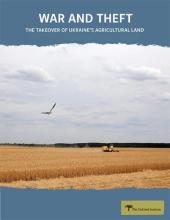Land Library Search
Through our robust search engine, you can search for any item of the over 73,000 highly curated resources in the Land Library.
If you would like to find an overview of what is possible, feel free to peruse the Search Guide.
/ library resources
Showing items 1 through 9 of 4599.Produite dans le cadre de l’école de chercheurs organisée au Sénégal par IPAR, le pôle foncier de Montpellier et l’Université Gaston Berger avec l’appui du CTFD, cette fiche pédagogique fait le point sur les instruments directs et indirects qui peuvent être mobilisés pour réguler les marchés fonc
Land is critical to the lives, livelihoods, and food security of millions of people across the world. But a series of unprecedented pressures on global farmland are now accelerating and converging.
This study focuses on land fragmentation in Ethiopia, exploring its impact on agricultural productivity and rural development. It proposes strategies for addressing fragmentation through land consolidation.
Le Code minier du Mali dispose que les ressources souterraines appartiennent à l’État, même s’il s’agit de terres agricoles. Cette disposition consacre le droit souverain de l’État sur les ressources du sous-sol, qui en organise l’accès et l’exploitation.
Green energy (and/or renewable energy) requires large areas of land to operate, often more so than energy generated from fossil fuels. The acquisition of land comes with accompanying corruption risks which can lead to challenges such as land grabbing and illegal displacement of communities.
Despite the existence of a legal framework defining the right to fair compensation, and notwithstanding the vast literature on transnational and domestic land deals, no theory has been developed so far to allow for a specific analysis of the economics of fair compensation in large-scale land acqu
War and Theft: The Takeover of Ukraine’s Agricultural Land, exposes the financial interests and the dynamics at play leading to further concentration of land and finance.








